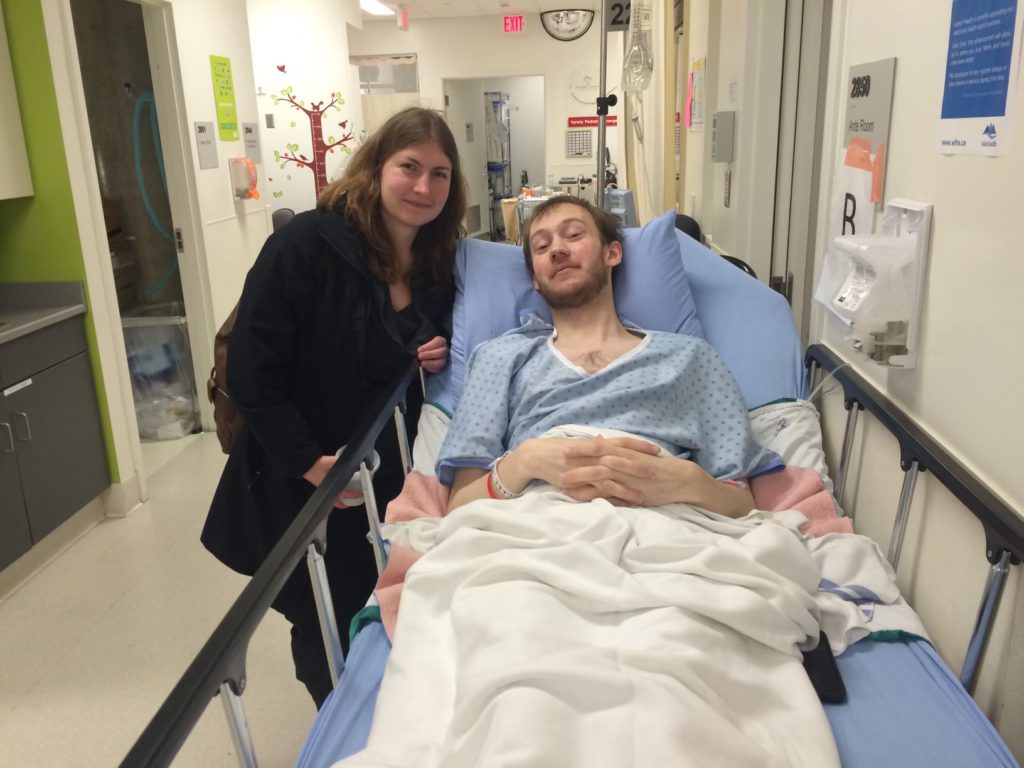
A Metchosin family is asking residents to consider becoming organ donors as one member needs a life-saving kidney transplant.
Nigel Sutcliffe was first diagnosed with kidney disease in his 20s.
Kidney disease is when your kidneys are damaged and can no longer filter your blood, causing toxins to build up in your body and leading to swelling, heart complications and a lowered immune system.
Over the years, Sutcliffe’s disease slowly progressed to the point where he needed his first kidney transplant. Six years ago, he went to Vancouver for transplant surgery, but it didn’t go as planned.
“I had a rejection right away and then I had an infection as well soon after that,” he said. “So I was in and out of the hospital for about six or seven months after that.”
Sutcliffe’s wife Rhiannon Pretty told CHEK News that they had one of their two daughters at the time, and it was hard travelling back and forth between home and Vancouver with her.
“We thought he was going to die every time I left the hospital,” said Pretty.

(Nigel Sutcliffe and Rhiannon Pretty in Vancouver for kidney transplant surgery.)
Doctors gave Sutcliffe one year to live, but he miraculously survived another five.
He said he was feeling good until this last year when his health started rapidly declining. In December, Sutcliffe’s kidney function lowered to about 10 per cent, so he started dialysis.
“The last blood test I had, it was at eight per cent [function] and that’s on dialysis,” he said.
Sutcliffe says dialysis normally gives a kidney about five to six percent of function on its own, meaning his natural kidney function has dropped to about two or three per cent.
“Which is basically nothing,” he added.
This has caused Sutcliffe to lose his immunity, meaning even a simple cold could be life-threatening.
With their oldest daughter now in school and their youngest being 18 months old, Sutcliffe and Pretty decided to isolate their family to protect them from any illness.
Pretty said she now works from home and they are homeschooling their daughter. She added they also don’t see many friends or family unless it’s outdoors and everyone is masked and healthy.
She said it feels like they are right back where they started after the first kidney transplant six years ago, but it could be fatal this time, so she fears for the future.
“He’s tired, he’s sick. I often find him sitting on the floor nauseous and unable to get up,” Pretty explained.
“I worry about our kids. I want them to have a dad. Like I even want them to have a dad long enough for our youngest to remember him. I know he’s not going to live the same life as other people live, the same time span.”
Sutcliffe is great at staying positive, but the reality of this shortened timeline is making them worry he isn’t going to survive, according to Pretty.
“I worry about not being here,” Sutcliffe said. “I worry about the future and what it’s going to look like for me, my wife and my two children.”
He added his only hope of surviving is to get another kidney transplant.
In 2022 there were 193 deceased kidney donors and 68 living donors in B.C., the Provincial Health Services Authority says. By Dec. 1, there were 421 patients on the transplant waitlist.
“The waitlist right now they are saying it’s anywhere between a year and a half to two year wait [for a deceased donor transplant],” Sutcliffe stated.
“But that’s just an estimate, it can change.”
He’s hoping to find a living donor that matches him because a living transplant could happen sooner and the organs tend to last longer in the recipient’s body.
“I don’t have any sort of antibody sensitivity, so it’s a broad spectrum that way. Blood types, I’m a type A blood. Which means I can have an A kidney blood type or an O,” Sutcliffe explained.
Both Sutcliffe and Pretty said a few of their friends have gone through the screening process to become a living donor but unfortunately didn’t pass all the tests for various reasons.
They hope that by sharing their story, they can inspire more people to consider becoming a living donor to save a life like Sutcliffe’s.
He said receiving a call that there is a donor match would be life-changing.
“Knowing that there’s a chance that this can get better. Knowing that I could just live my life, be there for my children as they get older. Just seeing them growing up, changing and playing with them,” Sutcliffe added.
Those looking to become a living donor are encouraged to contact Vancouver General Hospital Living Donor Program at 604-875-5182 or 1-855-875-5182. It can also be reached by email at [email protected].
St. Paul’s Hospital in Vancouver also has a living donor program. Potential donors can call 604-806-9027 or 1-877-922-9822 to reach the program. It can also be contacted via email at [email protected].




